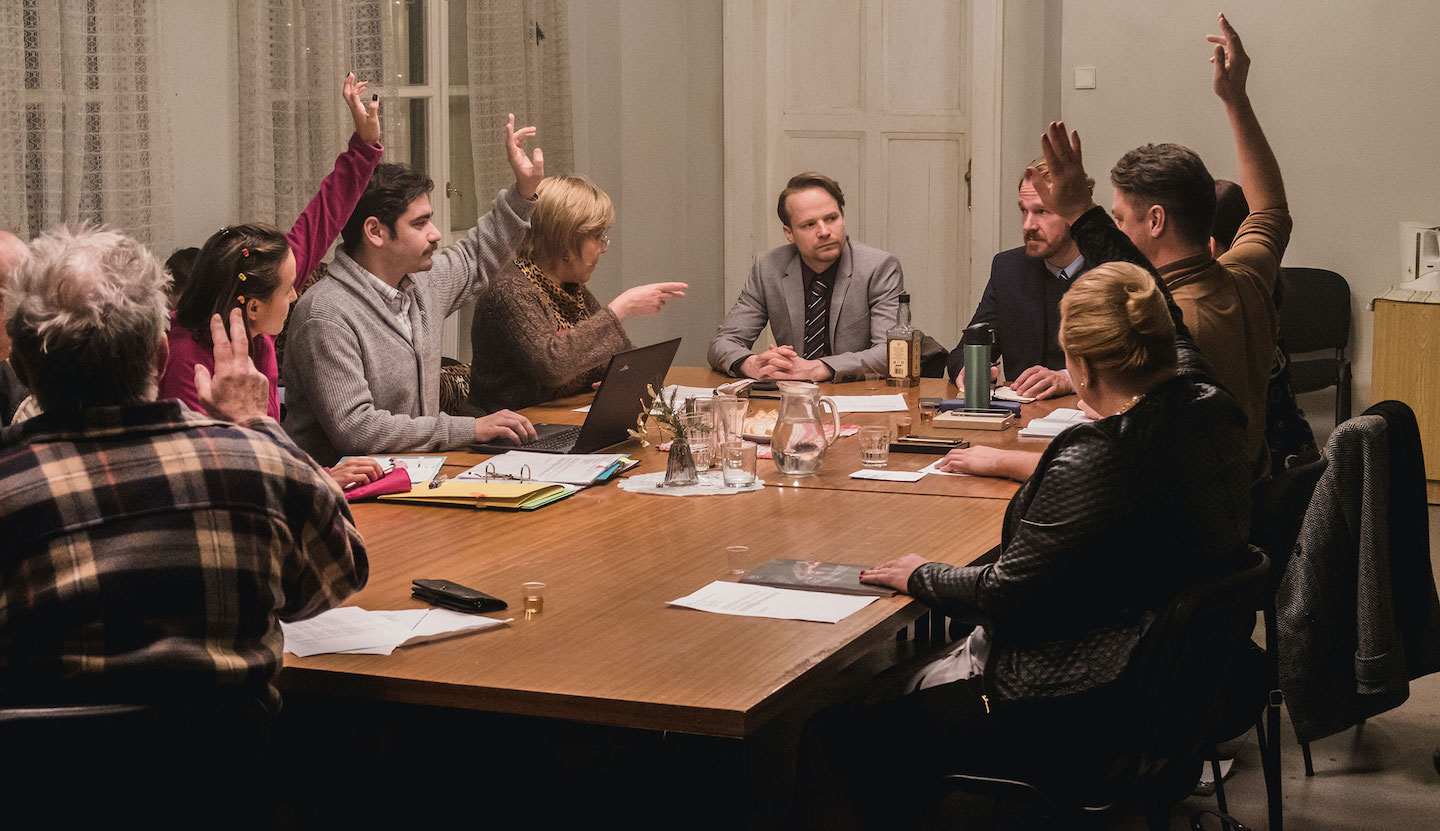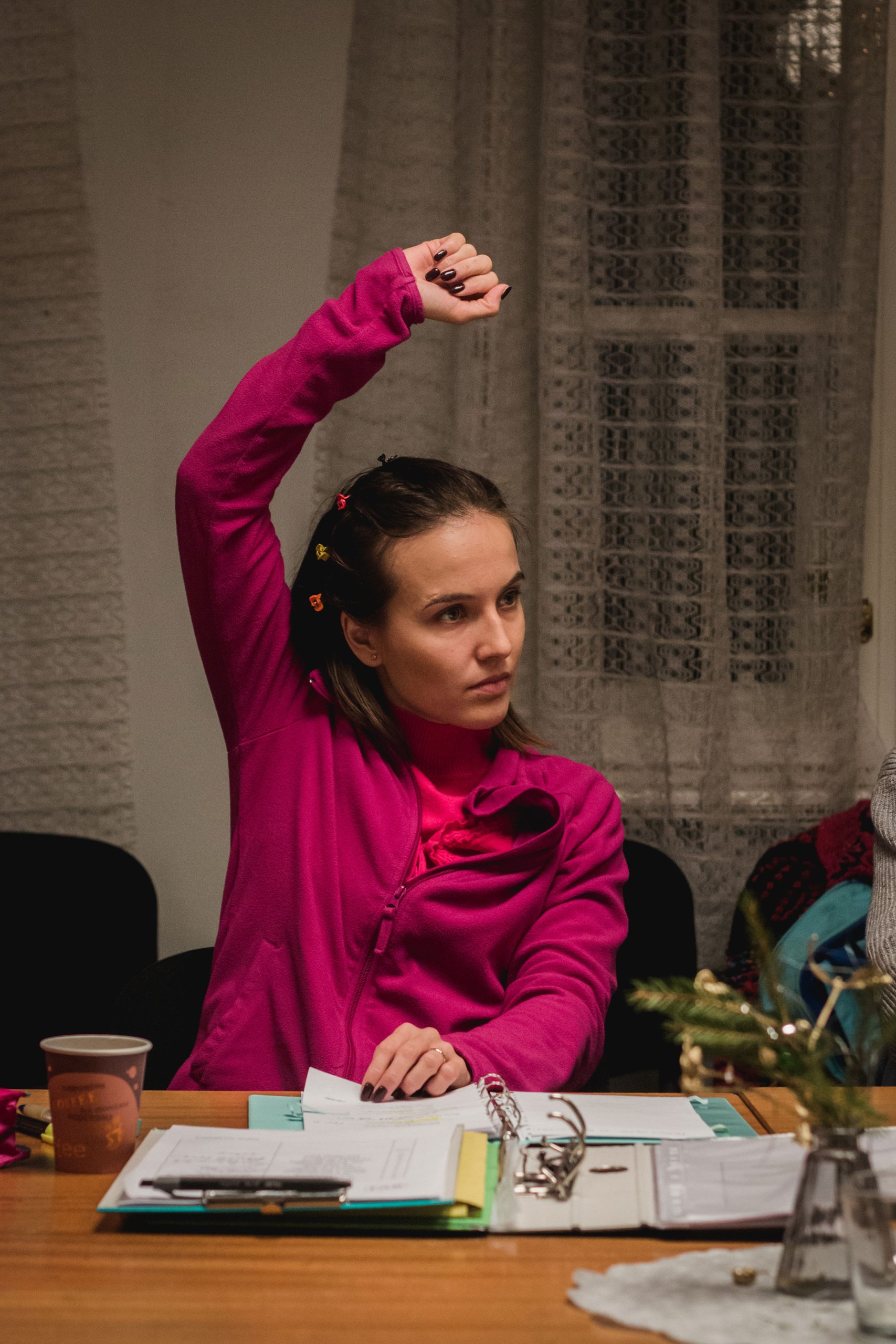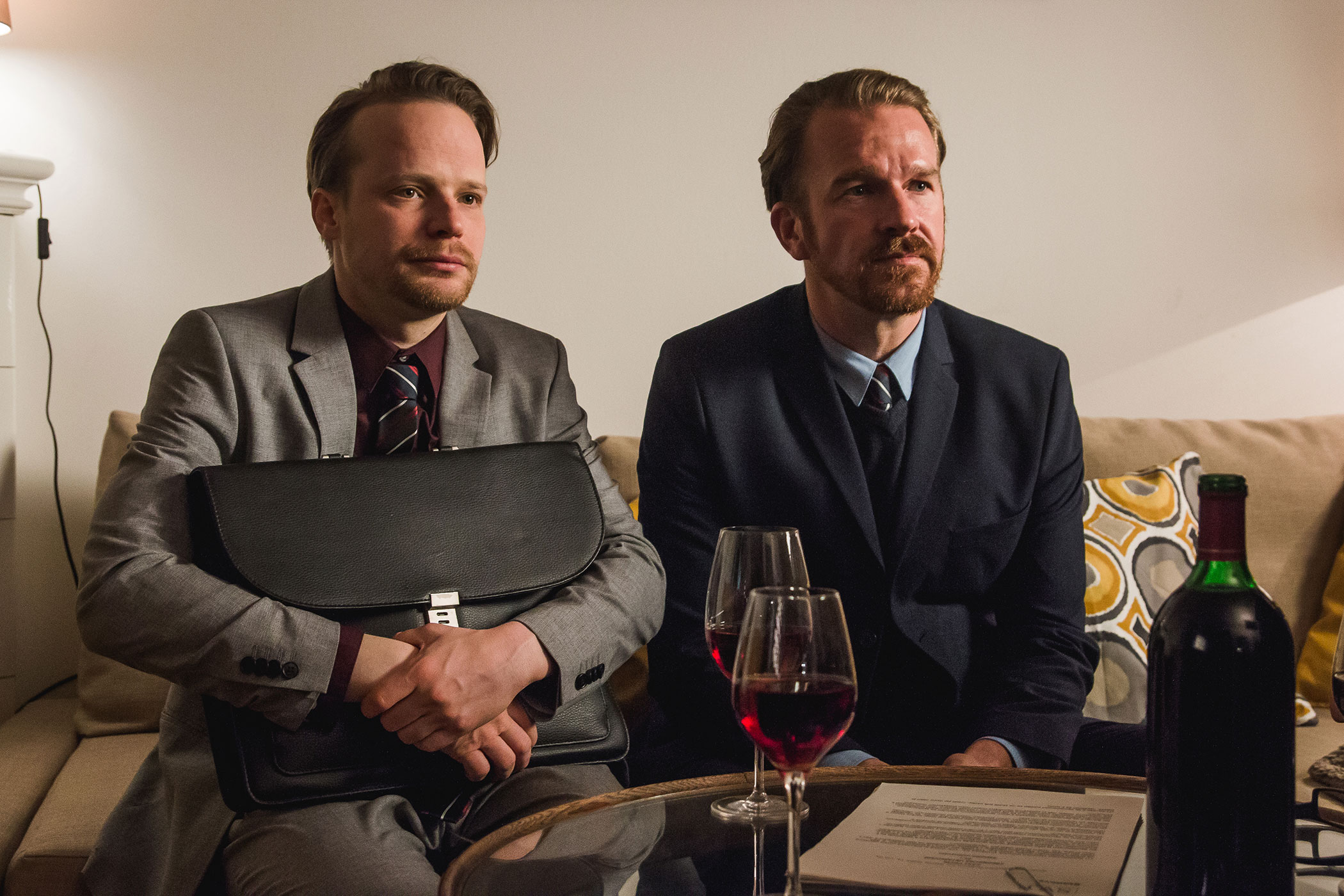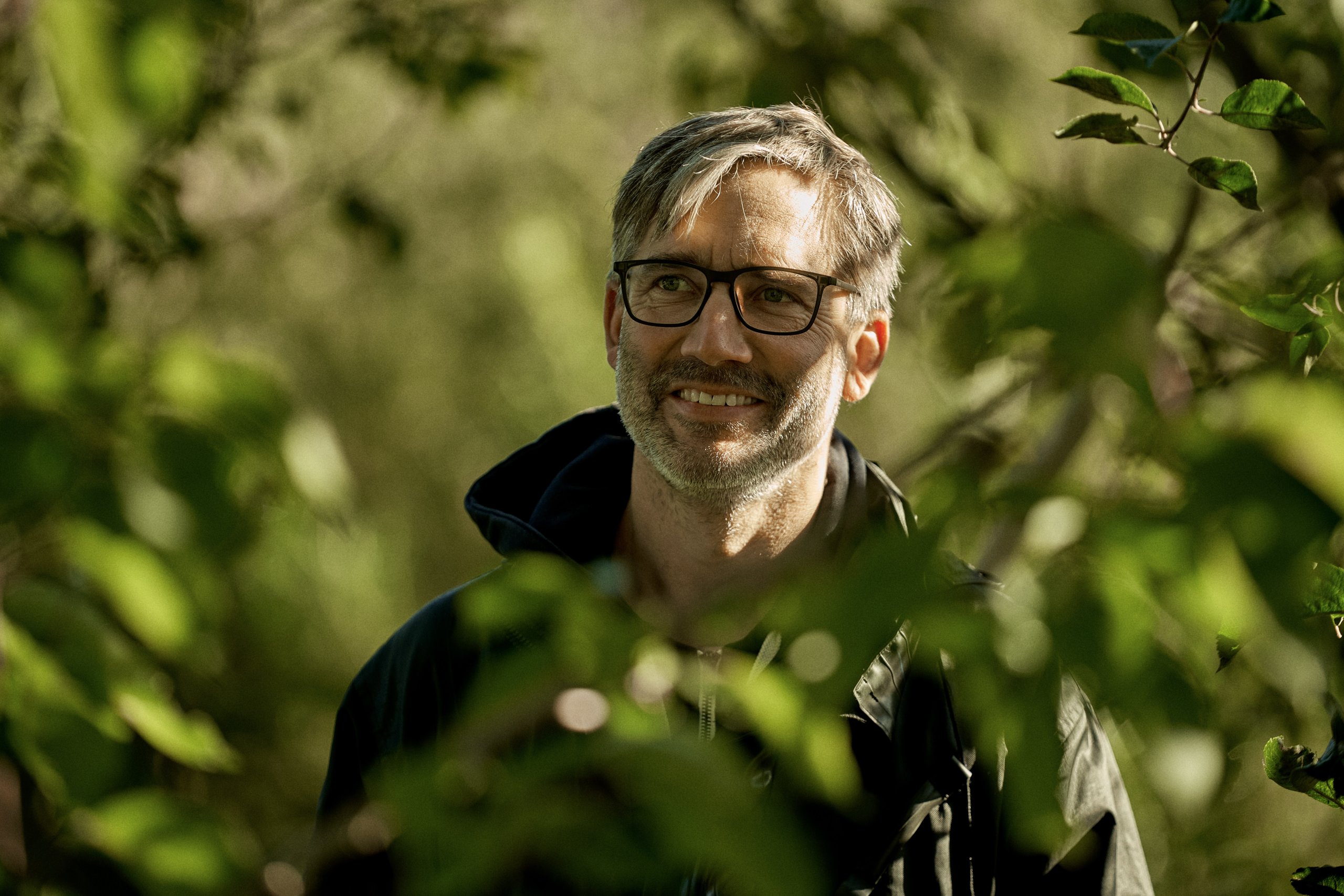Power and Personalities: Jiří Havelka on The Owners

When you hear the phrase “homeowner association,” what do you picture? Perhaps it is a council of stuffy suburbanites making rules on everything from the height of front lawns to the accepted color tulips allowed in one’s garden. Or maybe it’s the fine imposed for breaking one of those sometimes reasonable, sometimes pedantic rules. Through HOAs, homeowners can enjoy power over the place they live–even if this control extends only to something as minor as how high the neighborhood’s lawns should be.
In the Czech Republic HOAs are known by a different name: Associations of Unit Owners (SVJ), and serve as the inspiration for The Owners, a 2019 Czech comedy written and directed by Jiří Havelka. The film follows the unraveling of one Prague SVJ as an attempt to pass desperately needed improvements for the apartments is derailed by the residents’ various personal agendas. Though regarded by some reviewers as a portrait of a failing democracy, Havelka views his film more as a study of how seemingly ordinary people are transformed when they are handed even a fraction of power. The film will premiere in the US on August 18.
Frontrunner spoke with Havelka about homeowner associations (and SVJs), how power–however limited–changes people, and whether film can change minds.
This interview has been edited for length and clarity.

What inspired this film and the story?
Well, this is a very simple answer. This is my deep personal experience. I was a member of this, well, I found out that you call it an HOA (House Owners Association). We call it SVJ, and I was a member of that because I used to be the owner of an apartment unit at the very top floor. And I was trying very fiercely to get the elevator in the house and I never did. After ten years of frustrations, I moved out and the elevator is still not there, not even after the movie was released.
Did you ever keep in contact with anyone from the building and let them know about this film?
You know what? Actually, this was one of my biggest fears: that my neighbors would recognize themselves too easily in the movie. But actually, this didn’t happen because after premiere, I found out that it’s so, so typical. It’s such a frequent experience for viewers that they are seeing it more as their own house or as a metaphor. And I was in touch only with the, let’s say, liberal ones. Liberal neighbors. And they were very, very happy with the movie.
I believe this film was based on a play you wrote a few years ago. Is that correct?
Well, everyone thinks this, even in the Czech Republic, and I’m always answering that originally who initiated the movie was the film producer who came and asked me if I have any topics or themes or ideas that I would like to develop with him as a movie. Because till then, I was only known as a theater director–my background is theater. And he saw a lot of my plays and he came and asked and I gave him a bunch of topics. And among them there was this and we started to develop it. At almost the same time also we got this funding with my theater group called Vosto5 and we had to do another [theater] piece. I told them about this idea and we started to improvise on that, and these improvisations with actors actually very deeply influenced the final film script. So I would say it was like parallel and it was kind of an ideal synergy for me between the theater and movie. But it’s not that there was the stage version and we developed a movie based on the theater play.
So are you saying they were kind of developed in parallel at the same time?
Exactly. Almost at the same time. The first intention was to do a film, but the theater was finished earlier because, of course, it’s much easier to do a theater piece than to get all the money, all the funding for a movie. So the movie was released after the theater piece was already on the stage.
When I was watching the film, I noticed that the characters felt very precise and well-characterized. They each felt like they had their own role in the film in pushing the narrative forward. There’s nothing wasted in any of the characters. And since you mentioned how this is based on your own experience, I was curious about how these characters came about. Were they inspired by certain people or did you just have archetypes in mind that you wanted each role to fill?
Yeah, they were very much inspired by real people actually, my neighbors. When I moved in this house first, at the beginning, you have to sit in the second or third row. You are not allowed to be immediately around the table and be part of the discussions. But slowly I sneaked in and I started to put on the table my proposals, my visions that would be to the benefit of the whole house. And then I started to experience this very frustrated attitude that it’s very hard to come to agreement or to agree actually on anything, not because the people are against it, but because the people change their behavior and their manners during the meeting [compared] to what I know them to be in the pub or when we met in the corridor in the house. Suddenly they really changed. They were like different personalities when they were members of this association, because suddenly it gives you, as an owner, a very small percentage of power to veto, to ban something. And actually this gives you in a way meaning to your life. On this social platform you can show that you are a meaningful person, that you mean something to the others. And I was totally fascinated by the change of personalities more than by the [idea] that it’s actually also like a picture of collapsing democracy or something. So yeah these are my neighbors. And after the premiere I found out that they are at the same time like [archetypes] because everyone said to me, “hey, this is exactly like in our house.” But I didn’t want to make fun of them, to make a mockery. I didn’t want to laugh at them and didn’t want to show anyone that it is stupid. It’s more about this inability of making an agreement, which is really absurd because all the proposals are really to the benefit of everyone.

This film reminds me of a play in quite a few ways, including how it was filmed: mostly in just one room, around one table. Even though it mostly took place just in that room, it didn’t need any sort of big action sequences to be interesting. I never got bored. What choices did you make through the script writing and the directing to ensure that the story was able to hold the audience’s attention even without typical things that might be needed, like big action scenes or scene changes?
Well, this was a very crucial thing because when we started to get the funding for the movie, the biggest or the most frequent comment to this idea was, “this is theater. Why do you want to make a movie out of that?” Or, “this is non-dynamic, it’s all happening in one room. It’s a chamber movie.” And I was telling them that it’s the other way around. It’s not theater at all. I’ve been doing theater for 25 years and have never done a play that would be happening only in one place at one time. That theater is not really dependent on the unity of space and time. And I was telling them, this is much more a movie thing. It’s a film language because you need to grasp the viewer, the spectator and take him into this one hour and a half long meeting between people. And it’s not helping the movie if we are skipping to different places and or different times. It was quite hard to persuade them, but I was quite convinced that this is a really good idea. And of course I was using some “cheap” references, like 12 Angry Men because everyone knows the movie 12 Angry Men. And then it started to do something to the people because they were more open suddenly to understanding what we want to achieve. There was not any method or tactic that I would pick at the beginning or even before we started to do the film. We made a plan, of course, with [cinematographer] Martin Žiaran and with the producer Marek Jeníček. We made a plan that was surprisingly not divided in pictures, like normal movies would be shot. It was divided into situations. And I told them that, “I don’t know if we need two hours for this take or if we need the whole day.” But I was telling them that “trust me, we will find a way to do it.” And in the first two days of shooting, we found a method of really long takes, 20 minutes or even 25 minutes long, which was very challenging for the actors and for the whole crew because none of us was used to such a long time before the director would say, “stop”. But this was very helpful in terms of being concentrated for the situation. And I’m talking about each actor sitting around the table because till then they were like, “I’m not talking now. I don’t need to be totally focused.” But I was telling them, “you never know when the camera (we had two cameras) is recording you so be concentrated all the time.” And this was something like a method that was then helping to achieve what we achieved.
This next question is more about the themes of the film. You mention how the film was more inspired by your own experience on these Homeowner Association committees, but did you think much about democracy and the idea of failing democracies when you were writing this script?
Well, to be honest, these thoughts about bigger things like the collapse of democracy came actually after the movie and after the reviews, when I read all the possible interpretations of the movie. For me it was much more this question of one’s personality. Why you can behave in such a different way in different situations? Why are you changing your behavior according to who are you standing next to or in front of? Or who is putting you in different situations, which are not comfortable for you and make you much more aggressive or anything else? So for me, it’s more like a study of one’s behavior. But you are very right that at the same time, of course, it’s like a single cell that’s talking about the organism because it’s so simple and banal. The main situation is just 12 people sitting around a table. We knew from the very beginning that it has also this metaphorical dimension. And you cannot avoid that and you have to count on that. But during shooting, it was very much about the characters, about searching for the motivations for the allies and enemies and opponents that you have and that you can change. And about the network between the people.

As the filmmaker, what do you want audiences to take away from this film? Is there any further message or any sort of thought you want to leave them with?
Well, I’m quite skeptical about what can a spectator take out when the movie is finished. What I believe in is probably like the small change that would happen during watching the movie. If this movie can make a small crack that would change your world perspective a bit. And especially these doubts about why you have this opinion, what is it based on, or why this is your argument actually. Doubts are always a good thing because they are a path to empathy and solidarity and, well, we don’t have any other option than to share this world with other people. Like we share the house because there are too many of us. So we have to live one above another and we have to share the house as well. We have to share the planet. If the movie would make this small change in everyone that “let’s stop for a while and think about why am I standing for this opinion, for this argument,” then it’s enough for me.
Do you hope that people on these committees throughout the Czech Republic will see this film and might change their behavior if they see themselves in it and they realize what they’re doing and how they’re acting?
I would be happy if this happens. But I think that they laugh because they say to themselves, this is like in our house and these are like our neighbors. And they laugh at them, but they don’t really realize that actually they should laugh at themselves because it’s more a mirror than a picture. I did a lot of debates after the movie and of course it was more with people who were willing to remain sitting there and to be part of the debate. But I felt usually that there is this tendency to also see a different perspective, at least for a moment.
What is that perspective? Just the idea of distancing yourself from the characters, but seeing others in it?
Yeah. Yeah. When I was writing the script I felt like these are 12 characters that are inside of me and depending on which situation I would occur and I would be more like this, more like this, more like this.
Do you think films are able to really influence people in a meaningful way, or do you think people just think for a bit and then move on and continue with their lives?
Well, most of the time it’s just fun I think. I would be, as I said, skeptical about seeing the movie as something that can really make a big social change. But as we can see, for example, now from the movie Barbie, it can have a big influence, at least on fashion, you know, or something, so, well, why not? Why not believe in it? And why not try it with every new project, let’s believe that there can be. It’s just a small crack, small hole, a little shift. A small shift of perspective, but in a chain reaction it can do maybe something.

Do you have any new projects that you’re working on at the moment or any ideas that are coming up for you?
Well, that’s my problem, that I have tons of ideas and I can’t realize them all, I can’t make them all happen. But I’m just finishing a third movie [with] the working title Gardener. It’s about a gardener and his new neighbor who wants the land of the gardener. And I’m preparing two theater productions for next year.
Responses